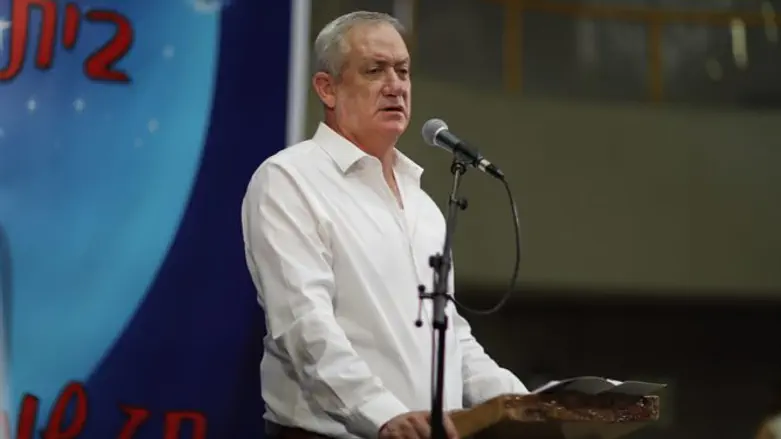
Defense Minister Benny Gantz told the U.S.-based Foreign Policy magazine that Israel would be willing to accept the return to a nuclear agreement with Iran, but that the Jewish State would expect Washington to prepare a serious “demonstration of power” if negotiations with Tehran come to a halt.
"The current US approach is to put the Iranian nuclear program back on the table and I agree with that," said Gantz adding that a US-led backup plan including economic pressure should be considered and that Israel would work to prepare its own contingency plan "C" that would include a military option if all else fails.
Gantz's remarks appear to mark a policy shift from former Prime Minister Netanyah's approach of opposing the 2015 nuclear deal and pressuring American administrations to abandon it in favor of a return to sanctions.
"The current U.S. approach of putting the Iran nuclear program back in a box, I’d accept that," he was quoted as saying.
With the Biden administration renewing diplomacy despite Iran's accelerated efforts to develop nuclear weapons, acting Prime Minister Naftali Bennett appears discontent with the lack of international support for Israel's fears of an Iranian breakout but remains hesitant to reproach Biden.
In the interview, Gantz estimates that Iran is two to three months from acquiring nuclear capacity and places blame with Netanyahu for the predicament Israel finds itself in.
“Israel inherited a situation in which Iran is at the most advanced point ever in its race to the bomb...The gap between [Netanyahu’s] rhetoric and speeches and actions is very big," he said.
The Defense Minister expresses scepticism about the chances that diplomacy impeding Iran's progress towards nuclear breakout.
Gantz says that while, “Israel has no ability to lead a real plan B, [it] can’t put together an international economic sanctions regime...led by the U.S.”
“Iran has to fear that the U.S. and its partners are serious,” he concludes.
Earlier in the week, Gantz warned that Iran was training terrorists from multiple countries on the use of attack drones at an air base within the Islamic Republic.
“Iran has developed ‘proxy terror’ which is perpetrated by organized ‘terror armies’ which are assisting Iran in achieving its economic, political and military goals. One of the most significant tools employed by Iran and its proxies is UAVs with a range of thousands of kilometers. Hundreds of these UAVs are spread across Yemen, Iraq, Syria and Lebanon. Iran is also attempting to transfer the know-how needed for UAV production to Gaza,” said Gantz during a speech at the annual International Institute for Counter-Terrorism (ICT) Conference at Reichman University.
On Sunday, AFP reported that International Atomic Energy Agency (IAEA) Director General Rafael Grossi hailed an agreement struck with Iran over access to surveillance equipment at Iranian nuclear facilities, saying it allowed space for diplomatic talk.
Grossi said that thanks to the agreement the agency will "be able to keep the information needed to maintain continuity of knowledge" of Iran's program, adding that, "the agreement on servicing the agency's equipment would be put into practice "within a few days, very soon".
Grossi’s visit followed an IAEA report published earlier this week and which criticized Iran for stonewalling an investigation into its past nuclear activities and jeopardizing important monitoring work.
Iran has gradually scaled back its compliance with the 2015 deal in response to former US President Donald Trump’s withdrawal from the agreement in May of 2018, though it has been holding indirect talks with the U.S. on a return to the agreement.
Negotiations were adjourned on June 20, two days after hardliner cleric Ebrahim Raisi claimed victory in Iran's presidential race, and no date has been set for a resumption of dialogue.

